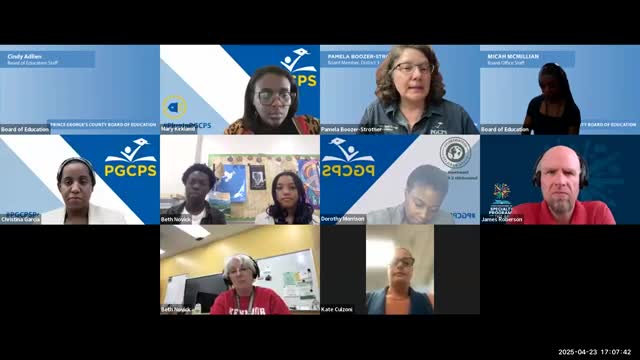PGCPS students press district to stop distributing plastic breakfast bags in some schools
Get AI-powered insights, summaries, and transcripts
Subscribe
Summary
Student investigators told the Prince George's County Public Schools Climate Change Action Plan Ad Hoc Committee that plastic bags used to hold breakfast items are unnecessary in many classrooms; district staff said they will research how many schools use the bags, their cost, and whether use can be reduced or eliminated in some sites.
Prince George's County Public Schools students told the district's Climate Change Action Plan Ad Hoc Committee on April 23 that plastic bags used to package breakfast items at some schools appear unnecessary and should be eliminated where they serve no purpose.
At the meeting, Olivia Thomas and Noah Agbere, eighth-grade students who led the research, said they noticed plastic bags used to hold cereal and other breakfast items at Kenmore Middle School and elsewhere and asked why the bags remained in use despite a countywide plastic bag law. "We are going to present information and guide a discussion about the problem of plastic bags being used in a seemingly unnecessary way at PGCPS breakfast in hopes that we can develop an effective approach," the students said during their presentation.
Why this matters: district staff and committee members tied the bags' continued use to pandemic-era service changes and to nutrition program requirements, and said continuing the practice could conflict with district sustainability goals. Mary Kirkland, director of Food and Nutrition Services, told the committee that in some schools the bags were introduced during COVID-19 to simplify distribution and to ensure students received a reimbursable meal under Maryland Meals for Achievement (MMFA) rules. Kirkland said she will visit Kenmore and other schools to determine where bags are used and whether usage can be reduced.
What was said and asked: students described their research process, including emailed questions to district staff and a follow-up Zoom meeting with Kirkland. Kirkland told the students the bags are provided separately (not prepackaged with cereal) and said district staff believed the bags helped monitor that students received items from each of the required food groups. She also noted that MMFA and Community Eligibility Provision (CEP) models vary by school — some schools offer breakfast in the classroom, others use kiosks or cafeteria service — and that service model affects how meals are packaged and delivered. At the meeting Kirkland clarified district totals: on a typical day about 45,000–50,000 students receive breakfast in PGCPS, and the district has served roughly 5,200,000 breakfasts during the 2024–25 school year.
Discussion and next steps: no formal motion or vote was taken. Committee members, students and staff discussed alternatives (paper or compostable bags, different service models, and in-classroom composting). Christina Garcia Sterling, the district lead for sustainable materials management and procurement, said the district is reviewing a sustainable purchasing policy and working with Purchasing to include environmental criteria in contracts. Mary Kirkland said the committee's goal should be to eliminate unnecessary plastic bags rather than simply swap to another single-use material; she asked that the district communicate proposed changes to school administrators in advance so managers and cafeteria staff can plan.
Community partners also raised possible operational responses. Michelle Burton of the Food Equity Council (Institute for Public Health Innovation) described an app developed at the University of Maryland that links excess produce to food pantries and suggested it as a logistical resource if schools can make surplus items available to families or community partners.
What staff agreed to research: Kirkland said she would follow up to determine (1) which schools currently use plastic breakfast bags; (2) the annual cost of purchasing those bags (the students reported ACME Paper as the vendor in their correspondence); and (3) how the district could eliminate bags in schools where they are unnecessary, with attention to the needs of cafeteria staff and students. The students asked the committee to consider as a first step removing bags from schools that do not eat breakfast in the classroom.
Ending note: committee chair Pamela Buser Struthers praised the students' work and encouraged continuation of collaboration between students, Food and Nutrition Services and Procurement as the district examines sustainable procurement and operational changes.
